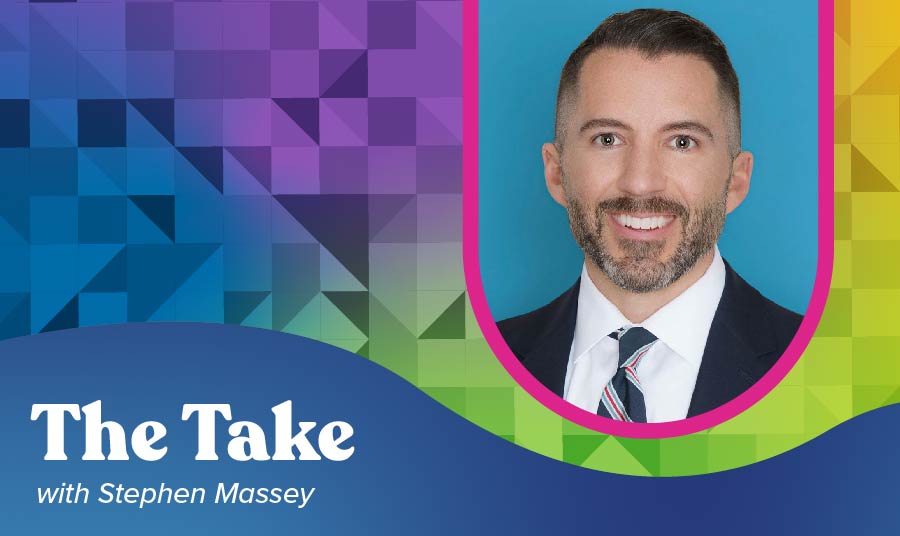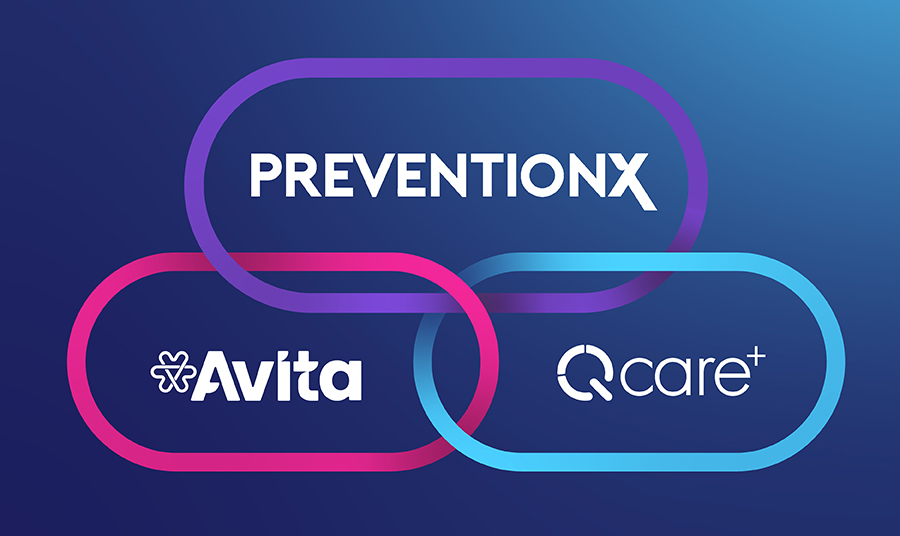Over the past two decades, Stephen Massey has helped build coalitions that tackle society’s most significant challenges and advance well-being for all. Early in his career, he served as a White House national security fellow in the Clinton administration, co-founded a non-profit health policy organization in Russia, managed a multi-million-dollar investment portfolio on behalf of a major operating foundation and the United Nations, and helped mobilize more than 300 of the world’s leading media companies in response to AIDS.
His latest initiative? As the co-founder of social change agency Meteorite, his team recently launched U.S. Business Action to End HIV, a coalition of private-sector organizations—and unlikely partners—coming together to end HIV and AIDS in the United States. In this edition of “The Take,” Avita Chief Advocacy Officer Glen Pietrandoni chats with Massey about why companies are uniquely positioned to help quash a 40-year health crisis, the headwinds they’ll face along the way, and why doing the right thing is “good for business.”
There's real power in business coalitions. Coalitions can do things single companies can't or won't do alone. They provide political cover, allow you to go further faster, and open an opportunity to share the lessons learned.
Stephen massey, co-founder, metEorite,
creator of u.s. business action to end HIV
How it all started: Uniting business & civil society for social good
Glen: Stephen, you have a fascinating background. What’s the backstory of how you got to where you are today, and what’s driving you and your colleagues to unite the government, non-profit, and business worlds in the fight to end HIV? 
Stephen: I’m excited to reconnect with you, Glen. You and I share a deep passion for HIV prevention and the vision that we can end HIV by the end of the decade.
I’ve been working on HIV for most of my career. I started at the White House as a national security fellow in the Clinton administration. At the time, I was working at the Russia, Ukraine, and Eurasian Affairs Office. I first became interested in HIV as a national security problem. We were witnessing a decline in the life expectancy of Russian men accelerated by the fastest-growing rate of new HIV infections in the world, as well as the fact that President Putin had not acknowledged the severity of Russia’s HIV crisis.
When then Vice President Gore lost the election, I decided to move to Moscow with a colleague of mine from the Clinton White House and create a non-profit HIV/AIDS organization in Russia called Transatlantic Partners Against AIDS. The idea was to replicate much of what the Kaiser Family Foundation was doing here in the U.S.; we wanted to bring together business and civil society to raise awareness, fight stigma, and combat the surging AIDS crisis in Russia and Ukraine.
The private sector is a critical force for good, and many employers are motivated by doing the right thing. Because at the end of the day, doing the right thing is not only good for their employees, it’s also good for their businesses.
STEPHEN MASSEY, CO-FOUNDER, METEORITE,
CREATOR OF U.S. BUSINESS ACTION TO END HIV
Why there's real power in business coalitions
Glen: Fascinating. How old were you then, and how did that impact your career?
Stephen: When I landed in Moscow, I was 21 years old. I had this big vision to help Russia address its HIV crisis, yet I didn’t know a word of Russian or have many connections to Russian society. But I’m somebody who’s determined to get stuff done. I spent the first year trying to understand the gravity of the problem and the levers of influence in Russian society. I quickly discovered that the stakeholders in Russian society most impacted by the HIV/AIDS crisis were business leaders, mainly in the oil and gas sector. This was also the industry with the most influence over the Kremlin.
I spent the better part of my first couple of years in Russia working with Russian oil and gas companies, conducting HIV education, sex education, and related training. I also mobilized Russian media companies to begin normalizing HIV through storylines and television shows. It was a formative period for me; I was learning about the private sector’s power to influence change. I learned there’s real power in business coalitions. Coalitions can do things single companies can’t or won’t do alone. They provide political cover, allow you to go further faster, and open an opportunity to share the lessons learned.
I share that story because a lot of it is relevant to the work I’m doing today. I believe the private sector is a critical force for good, and many employers are motivated by doing the right thing. Because at the end of the day, doing the right thing is not only good for their employees, it’s also good for their businesses.
When I landed in Moscow, I was 21 years old. I had this big vision to help Russia address its HIV crisis, yet I didn't know a word of Russian or have many connections to Russian society. But I'm somebody who’s determined to get stuff done.
STEPHEN MASSEY, CO-FOUNDER, METEORITE,
CREATOR OF U.S. BUSINESS ACTION TO END HIV
Launching U.S. Business Action to End HIV
Glen: Speaking of leveraging the private sector as a force for good, on World AIDS Day last December, you launched U.S. Business Action to End HIV. I know this initiative didn’t just happen overnight. Walk us through how it came to be.
Stephen: Here’s how it all started: My business partner, Steven Levine, and I created Meteorite four years ago to build coalitions, mostly within the private sector, that strengthen our democracy and improve health and wellness across the country. We launched Meteorite with a program called the Civic Alliance, now a non-partisan coalition of 1,300 companies working together to strengthen democracy by encouraging civic participation.
Then we got a call from the CDC (Centers for Disease Control and Prevention) Foundation asking if we could do for vaccines what we had done for voting. So, in 2021, Meteorite created the Health Action Alliance, a coalition that has now grown to more 6,000 employers across the country working together to improve health and wellness for their employees in the communities where they operate. The Health Action Alliance sits at the intersection of business and public health. Our goal is to help public health work better and faster by partnering with employers, and to help employers make better decisions for their employees, customers, and communities by educating them about the nuances of public health.
Our focus began with COVID-19 vaccines, and ensuring employers had the tools, training, and support they needed to fight vaccine misinformation in the workplace and improve vaccine access for historically marginalized communities. As we were building all of that, I got a call from the CDC inviting me to present to PACHA, the Presidential Advisory Council on HIV/AIDS. The council was considering the private sector’s role in the National HIV/AIDS Strategy, which was created to focus the U.S. public health infrastructure on ending HIV by 2030.
When I presented to PACHA, I told them there is a role for the business community to play in ending HIV, but there needs to be a strong business case. I explained that a business coalition could help accelerate progress and fill gaps in the HIV response if organized through a mobilizing entity that understands how to work with the private sector and build relationships. And I volunteered the Meteorite team to take that on.
ViiV Healthcare provided the initial grant to Meteorite and the Health Action Alliance to conduct a discovery and landscape analysis to understand what business sectors are most impacted by HIV/AIDS. We found that while there had been many attempts at mobilizing the private sector to fight HIV and AIDS over the years, there was never a focused U.S. coalition mobilizing employers to help advance the goals of the National HIV Strategy. There was a white space in the marketplace, and it was obviously the right time. I was thrilled when we brought together an initial group of 15 member companies to form the U.S. Business Action to End HIV last December 1st—World AIDS Day—in Washington, D.C.
Our goal is to help public health work better and faster by partnering with employers, and to help employers make better decisions for their employees, customers, and communities by educating them about the nuances of public health.
STEPHEN MASSEY, CO-FOUNDER, METEORITE,
CREATOR OF U.S. BUSINESS ACTION TO END HIV
No lip service: The coalitions' 6 primary goals
Glen: Avita was proud to be one of the 15 founding members. Tell us more about what this cohort of U.S. business leaders is committed to achieving and how you formulated those goals.
Stephen: In forming the coalition, the first thing we did was ensure the initiative was grounded in the needs of the community. We met with more than 30 HIV community leaders around the country in advance of December 1st to understand the key actions the private sector could take to help advance the goals of the National HIV Strategy.
We came up with a set of six specific actions we felt would be most beneficial. Those included creating HIV non-discrimination policies in the workplace, which very few companies have right now. We also recognized that many of the changes companies had made to their internal policies during the COVID-19 pandemic would be helpful in the fight to end HIV. Initiatives like educating workers and fighting HIV stigma in the workplace, strengthening HIV coverage and non-discrimination policies for employees, providing paid time off for employees who may be on PrEP (pre-exposure prophylaxis) or HIV treatment to get their labs and check-ups, advocating for improved HIV policies and systems change, and leveraging their unique capabilities to implement innovative strategies in the communities where they operate.
We don’t want this to be just lip service for HIV. We want companies to say, “Okay, here’s what we’re specifically going to do.” We ask them to commit to one of these six actions.
We don't want this to be just lip service for HIV. We want companies to say, “Okay, here's what we’re specifically going to do.”
STEPHEN MASSEY, CO-FOUNDER, METEORITE,
CREATOR OF U.S. BUSINESS ACTION TO END HIV
An opportunity for businesses to step up
Glen: Not all companies in this coalition have businesses focused on HIV prevention and treatment, like drug manufacturers or pharmacies. Many of those that joined have no real business model connection to HIV, but they employ many people and influence many people. That was the most impressive piece for me.
Stephen: Absolutely. That’s the goal. We started with 15 businesses, but we’re inviting more than 6,000 employers to attend our National HIV Employer Summit on April 20th. We want to include more companies that aren’t directly connected to HIV and help them understand that HIV affects so many Americans. There are employers in certain geographies that really can and should lean in here to improve the health of their workers and the communities in which they operate.
I’m excited to see companies like Uber step up and say, “Look, we have a unique platform. We can deliver medication to the communities that need it.” That’s the kind of innovation that can come from an initiative like this, and it’s only the beginning. Mercer, a large benefits advisory firm, also has joined the coalition. They’ll build this initiative into their engagements with the companies they advise and help their clients center HIV as part of their commitments to health equity, diversity, inclusion, and belonging. It’s a new phase, and it’s the kind of work needed to get us to our goal of ending the epidemic by 2030.
Is your business ready to help End HIV?
on April 20, 2023
The private sector and ending HIV by 2030
Glen: Let’s talk about that goal. In 2019, the U.S. Department of Health and Human Services announced a bold plan to end the HIV epidemic in the United States by 2030. We’ve got less than seven years left. What’s it going to take for our nation to hit the mark?
Stephen: Look, this is a moonshot. Ending HIV by 2030 will require everyone to come to the table, including the private sector. I’m honored that Meteorite has been asked to help bring the private sector in to do this work. I don’t think we can end HIV in the U.S. without the support of employers.
During the COVID-19 pandemic, we could not have turned the tide without the active engagement of the employers that provided on-site testing, time off for workers to get vaccinated, and education about vaccines and preventing infection in the workplace. Americans trust their employers more than almost every other source of information, including the media and government. They play a crucial role in how we all get our health care.
But beyond the private sector, there is a critical need for our policy leaders and the media to bring sustained funding for and attention to HIV to ensure that it continues to be a priority.
It’s also critical that we don’t roll back ACA (Affordable Care Act) laws. Braidwood Management vs. Becerra is very damaging, and it could really impede our progress.
So, there are important headwinds. But the community and our policy leaders have made this commitment, and I’m excited to help accelerate progress by bringing the private sector to the table.
This is a moonshot. Ending HIV by 2030 will require everyone to come to the table, including the private sector. I don't think we can end HIV in the U.S. without the support of employers.
STEPHEN MASSEY, CO-FOUNDER, METEORITE,
CREATOR OF U.S. BUSINESS ACTION TO END HIV
Addressing the headwinds
Glen: How about some of the other thinly veiled discriminatory legislation taking place right now, like Tennessee refusing millions of dollars of federal funding to prevent and treat HIV?
Stephen: Meteorite is a non-partisan organization. So, I will speak personally, not as a representative of Meteorite or the Health Action Alliance. But as a gay man who cares about this issue, these efforts to undermine preventive health for HIV services are alarming.
In my opinion, it’s critical that people with HIV have access to life-saving care and that people disproportionately at risk of acquiring HIV have access to services. Both the Braidwood case and the decision by Tennessee will hurt the progress we have made as a nation over the past 40 years to end HIV.
If PrEP coverage is rolled back, it will be a major setback. I’ve been on PrEP for six or seven years now; I know what these life-saving medications mean for millions of Americans. So, I hope there’s an opportunity for businesses to step in and create employer policies that help those who might lose access to PrEP continue to receive coverage. I hope this is not an early sign of a wider attempt to roll back access to these medications.
Beyond the private sector, there is a critical need for our policy leaders and the media to bring sustained funding for and attention to HIV to ensure that it continues to be a priority.
STEPHEN MASSEY, CO-FOUNDER, METEORITE,
CREATOR OF U.S. BUSINESS ACTION TO END HIV
Early wins for U.S. Business Action to End HIV
Glen: Let’s end on a positive note: Tell me about early wins for the U.S. Business Action to End HIV.
Stephen: First, it’s important to note that we were able to bring this coalition together. It includes companies that compete with one another in the marketplace yet are finding ways to work together.
Other early wins? Last World AIDS Day, one of the coalition’s member companies—Match Group—activated in-app messages about the importance of HIV testing across some of the largest online dating platforms in the country, including Tinder, BLK, and Chispa.
And as I mentioned earlier, Mercer is beginning to incorporate HIV guidance into their work with the employers they counsel. We aim to release our first suite of resources for employers on April 20th. It will include an HIV education guide to help employees fight stigma in the workplace and a guide for HR and benefits team leaders that includes best practices to strengthen HIV benefits and non-discrimination policies. These will be free resources available to the 6,000-plus companies in the Health Action Alliance network. We’ll release them at a virtual summit we’re organizing in partnership with the National LGBT Chamber of Commerce.
In addition to all of that, we’re developing industry cohorts to tackle specific challenges. Our first, working with Business Action to End HIV members, will represent pharmacies. This cohort is designed to explore the expansion of pharmacists’ authority to provide HIV Services, including HIV testing and PrEP and PEP (post-exposure prophylaxis) prescribing in pharmacy settings. Glen, thank you for being part of that cohort and helping advise us as we’re building it.
We’re also imagining what we call “innovation hubs” across the country. Our first innovation hub will likely be in Atlanta. We’ll bring together the public health department, local HIV community leaders, and local businesses in that community to identify specific challenges the private sector could help solve. We’re hoping to pilot that initiative this year and expect to expand to a second market in late 2023 or early 2024.
This coalition includes companies that compete with one another in the marketplace yet are finding ways to work together.
STEPHEN MASSEY, CO-FOUNDER, METEORITE,
CREATOR OF U.S. BUSINESS ACTION TO END HIV
How to get involved
Glen: How do businesses get involved in U.S. Business Action to End HIV if they haven’t done so already?
Stephen: They can find us online at https://www.healthaction.org/endhiv or email us at [email protected]. And they can register for our April 20th virtual event here.
About Stephen Massey:
Stephen is a social entrepreneur and co-founder of Meteorite, an impact agency that builds large-scale private sector coalitions to strengthen our democracy and improve health and wellness in communities across the country. In this role, he serves as Managing Director of the Health Action Alliance, a unique partnership between leading business, communications and public health organizations to help employers respond to emerging health challenges, improve health equity and help rebuild public health. In 2022, HAA launched U.S. Business Action to End HIV, a growing coalition of businesses committed to accelerating progress to end HIV in the U.S. by 2030.
Over the past two decades, Stephen has built Emmy and Peabody Award-winning campaigns on a wide range of social issues, and he has cultivated initiatives with major foundations, media organizations, government agencies and Fortune 500 companies. Prior to launching Meteorite, Stephen helped lead the Global Media AIDS Initiative, a joint effort between the United Nations and the Kaiser Family Foundation that mobilized more than 300 of the world’s leading media companies in response to AIDS. In 2002, Stephen co-founded Transatlantic Partners Against AIDS, a non-profit policy organization based in Moscow that brought together business and civil society to raise awareness, fight stigma and combat the surging AIDS crisis in Russia and Ukraine.
A first-generation Cuban-American, Stephen served as a White House National Security Fellow in the Clinton Administration studied international development and economics at Georgetown, Columbia, and Oxford Universities.
About Glen Pietrandoni
Glen is chief advocacy officer at Avita Care Solutions, an award-winning pharmacy leader, passionate 340B program advocate, and internationally respected HIV and LGBTQ+ activist. He’s deeply engaged in Avita’s mission to advocate for health equity and the 340B Drug Pricing program and works to bring together stakeholders from the pharmaceutical industry and patient advocacy arenas. Through webinars, conferences, Avita’s thought leadership blog series “The Take,” and the organization’s engagement with multiple community and trade associations, Glen leads Avita’s educational and awareness efforts and acts as a voice for its covered entity partners and patients. He continually fights for continued access to the 340B program and advances stigma-free HIV, PrEP, LGBTQ+, and sexual wellness care for underserved patient populations.
Glen recently received Pharmacy Times’ Lifetime Leadership honor at the Next-Generation Pharmacist awards. He serves on the Board of Pharmacy for the State of Illinois, was formerly chairman of the Board of Trustees of AIDS United, and sits on the board of Community Voices for 340B (CV340B). He has earned American Academy of HIV Medicine and Apexus 340B certifications.




